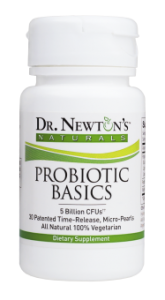In recent years, probiotics have become a popular topic. More people are interested in the health benefits they offer and the research community is interested in their possible use as a form of preventative health care. With all the increased interest there are bound to be questions. Here are five things you should know about probiotics
1) What are Probiotics?
Probiotics are a very important part of the microorganisms that your body is made up of. Oxford Journals defines probiotics as…
“…live microorganisms that, when administered in adequate amounts, confer a health benefit on the host.” – http://cid.oxfordjournals.org/content/46/Supplement_2/S58.full
There are around 100 trillion probiotic organisms inside your gastrointestinal tract. It’s a big number. In fact, probiotics outnumber human cells at a rate of 10 to 1![1] These microorganisms are naturally present in your body and play an important role in a healthy digestive system. They’re also important to counter balance harmful bacteria that also thrive in the intestinal tract.
[2]By providing the proper balance of helpful bacteria, probiotics can:
- help with your digestion;
- improve your immune system;
- help prevent infections;
- improve nutrient uptake;
- and help protect you from harmful bacteria and viruses.
However, when the balance shifts and harmful bacteria out-number helpful bacteria you may experience symptoms like:
- gas,
- bloating,
- irregularity,
- and other digestive concerns.
2) What causes helpful probiotics to be depleted in your body?
Unfortunately, there are a lot of things working against you that can reduce the number of good probiotic organisms in your body.
Diet
 [3] Diet plays a major role in a healthy or unhealthy gut. For example a diet that is high in sugar, fats and processed foods encourages less-beneficial flora (aka harmful bacteria) to flourish which in turn can cause gas, bloating and even inflammation. Eating a balanced diet consisting of plenty fruits and vegetables can help support a healthier balance of probiotic organisms in your gut.
[3] Diet plays a major role in a healthy or unhealthy gut. For example a diet that is high in sugar, fats and processed foods encourages less-beneficial flora (aka harmful bacteria) to flourish which in turn can cause gas, bloating and even inflammation. Eating a balanced diet consisting of plenty fruits and vegetables can help support a healthier balance of probiotic organisms in your gut.
Antibiotics
[4] Taking prescribed antibiotics can disrupt levels of gut flora and may allow pathogenic bacteria to grow. While antibiotics can be extremely beneficial in killing “bad” bacteria, they unfortunately, kill the good bacteria as well. Add to this that you may be getting unwanted antibiotics from some of the food you eat and it’s easy to see how quickly your gut flora can be adversely affected.
Stress
Stress may also cause a change in your gut flora. Based on a [3] 2011 study, stressed-out mice (which had been left in a cage with aggressive mice) experienced a plunge in beneficial bacteria and an increase in inflammatory chemicals in the blood serum.
Chemicals
Environmental toxins and even chemicals found in drinking water (like chlorine) may be harmful to good probiotic organisms.
3) How important are probiotics to your overall health?
[5] According to Michael Snyder, PhD. ,Director of Stanford University’s Center for Genomics and Personalized Medicine…
“There’s a good chance your microbiome is associated with every disease you can think of — diabetes, cancer, autism,” – curated http://www.webmd.com/digestive-disorders/news/20140820/your-gut-bacteria
4) Can you get enough probiotics from the foods you eat?
Probiotics are mostly found in fermented foods like yogurts (those with live, active cultures), sauerkraut and kimchi. However, it’s difficult, to get enough probiotics through the foods you eat. In order to maintain a well balanced gut flora you’ll need to consider supplementation.
5) What’s the best way to select a probiotic supplement?
There are several important factors to consider in selecting a good probiotic supplement ranging from the amount of probiotics you’re getting and the delivery method used to the strains used in the formula.
Delivery Method
To be beneficial, probiotics need to be delivered to the gastrointestinal tract but to get there they need to survive the harsh, acidic environment of the stomach. Probiotic formulas delivered in veggie capsules don’t offer adequate protection which means many of the probiotics don’t survive long enough to deliver any benefit.
Enteric coated capsules (which are made of synthetic chemicals sprayed onto the outside of the capsule) do a better job protecting probiotics from stomach acid. However, air and moisture trapped inside the capsule can cause many probiotics to die before you take them.
The best option to ensure you get health benefits from a probiotic is to look for one that utilizes Bio-Tract technology. Bio-Tract technology, which is patented in 33 countries, protects probiotics from the harsh, acidic environment of the stomach without capturing air and moisture inside. The result is more beneficial probiotics reaching your gastrointestinal tract where they’re able to provide the health benefits you want.
Colony Forming Units (CFUs)
The amount of probiotics in a supplement are described in CFUs or Colony Forming Units. However, more doesn’t necessarily mean better.
Studies have shown that powders, liquids, and probiotics in capsule form, such as those described above, only deliver 4% of their probiotics to the gastrointestinal tract. In comparison, in vitro lab testing shows 60% of probiotics delivered using Bio-Tract technology reach the gut alive. This is an important consideration when comparing probiotic supplements.
For example a capsule product with 50 billion CFUs only delivers 2 billion probiotics to the intestines where another product with Bio-Tract Technology and 5 Billion CFUs delivers 3 billion probiotics and is a more effective option.
Probiotic Strains
Because approximately 80% of your digestion takes place in the small intestine and 20% in the large intestine it’s important to look for a formula with strains of probiotics that closely match and compliment your digestive system. When you review probiotic labels you’ll see strains that start with an “L” or a “B”. L stands for Lactobacillus which specifically support the small intestine. B stands for Bifidobacteria which support the large intestine. (Hint: L = Little for small intestine and B = Big for Large intestine).
Look for a formulation that provides approximately 80% strains to support the small intestine and 20% to support the large intestine.
Summary
Probiotics are important for digestive health and overall health. While it’s possible to get some of the probiotics you need from food, supplementation is needed for optimal health. Choose your supplements wisely and consider delivery method, formulation and CFUs to determine your best option.
Recommended
 I recommend Dr Newton’s Probiotic Basics. Probiotic Basics has a powerful, balanced formula of 8 probiotic strains which are time released to provide the helpful probiotics you need throughout the day. Probiotic basics uses Bio-Tract Technology and is formulated with 72% Lactobacillus and 28% Bifidobacteria strains which compliment your digestive system.
I recommend Dr Newton’s Probiotic Basics. Probiotic Basics has a powerful, balanced formula of 8 probiotic strains which are time released to provide the helpful probiotics you need throughout the day. Probiotic basics uses Bio-Tract Technology and is formulated with 72% Lactobacillus and 28% Bifidobacteria strains which compliment your digestive system.
Finally, Probiotic Basics uses LivBac manufacturing which is a unique process that improves the shelf-life of probiotics without the need for refrigeration. Probiotics manufactured in capsule form are less stable and require refrigeration.
Find out more about Probiotic Basics at Dr Newton’s Naturals.
Sources
- Martín, Rebeca, Sylvie Miquel, Jonathan Ulmer, Noura Kechaou, Philippe Langella, and Luis G. Bermúdez-Humarán. “Role of Commensal and Probiotic Bacteria in Human Health: A Focus on Inflammatory Bowel Disease.” Microbial Cell Factories. BioMed Central, 23 July 2013. Web. 03 June 2016, from http://www.ncbi.nlm.nih.gov/pmc/articles/PMC3726476/
- Probiotics. (2016, April 08). Retrieved June 02, 2016, from http://nccam.nih.gov/health/probiotics/
- Stewart, M. (2014, June 18). 4 habits for a healthy gut. Retrieved June 02, 2016, from http://www.cnn.com/2014/06/18/health/good-gut-bacteria/
- Gut flora. (2015, October 01). Retrieved June 02, 2016, from https://en.wikipedia.org/wiki/Gut_flora
- Collins, S. (2014, August 20). What Is Your Gut Bacteria Telling You? Retrieved June 02, 2016, from http://www.webmd.com/digestive-disorders/news/20140820/your-gut-bacteria




